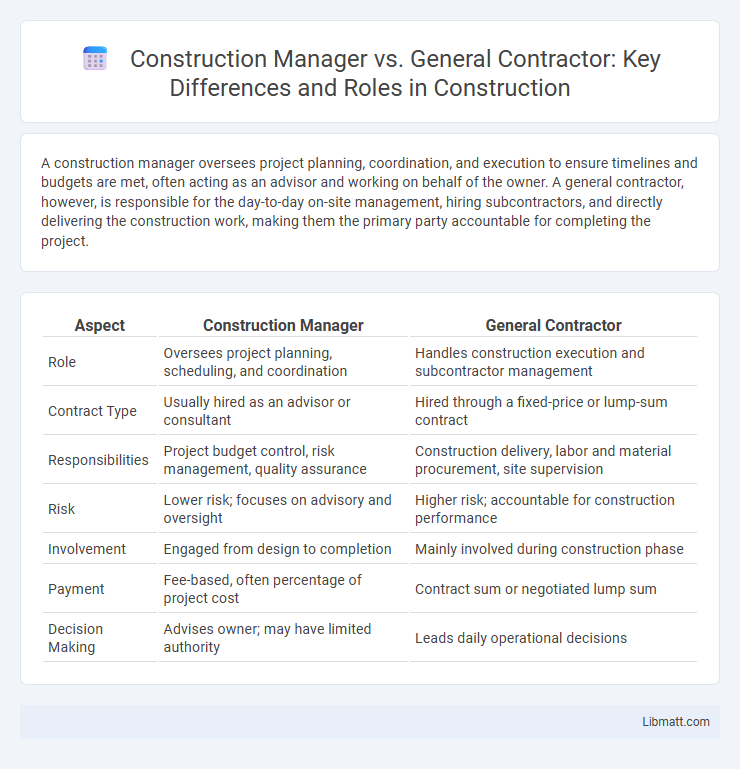A construction manager oversees project planning, coordination, and execution to ensure timelines and budgets are met, often acting as an advisor and working on behalf of the owner. A general contractor, however, is responsible for the day-to-day on-site management, hiring subcontractors, and directly delivering the construction work, making them the primary party accountable for completing the project.
Table of Comparison
| Aspect | Construction Manager | General Contractor |
|---|---|---|
| Role | Oversees project planning, scheduling, and coordination | Handles construction execution and subcontractor management |
| Contract Type | Usually hired as an advisor or consultant | Hired through a fixed-price or lump-sum contract |
| Responsibilities | Project budget control, risk management, quality assurance | Construction delivery, labor and material procurement, site supervision |
| Risk | Lower risk; focuses on advisory and oversight | Higher risk; accountable for construction performance |
| Involvement | Engaged from design to completion | Mainly involved during construction phase |
| Payment | Fee-based, often percentage of project cost | Contract sum or negotiated lump sum |
| Decision Making | Advises owner; may have limited authority | Leads daily operational decisions |
Introduction: Construction Manager vs General Contractor
Construction managers oversee project planning, budgeting, and coordination, ensuring all phases align with client goals and building regulations. General contractors specialize in hiring subcontractors, managing on-site construction activities, and securing materials to complete the project on schedule. Both roles are essential for successful construction projects but differ in scope, responsibilities, and contractual relationships.
Defining Roles: Who is a Construction Manager?
A Construction Manager oversees the planning, coordination, and control of a construction project from inception to completion, ensuring timelines, budgets, and quality standards are met. Unlike a General Contractor who typically handles subcontractor hiring and on-site supervision, the Construction Manager acts as the owner's representative, providing expertise in cost estimation, scheduling, and contract management. This role involves strategic decision-making and collaboration with architects, engineers, and stakeholders to optimize project outcomes.
Defining Roles: Who is a General Contractor?
A general contractor is a licensed professional responsible for overseeing the entire construction project, including hiring subcontractors, managing schedules, and ensuring compliance with building codes. Unlike a construction manager who primarily offers advisory and coordination services, a general contractor takes on contractual obligations, assumes financial risk, and directly handles procurement and labor. This role is critical for delivering projects on time, within budget, and according to specified quality standards.
Project Involvement: Timeline and Responsibilities
Construction managers engage from project inception through completion, overseeing planning, scheduling, and coordination to ensure timelines are met and quality standards upheld. General contractors focus primarily on the execution phase, managing subcontractors, procurement, and on-site activities to deliver the project according to the construction schedule. The construction manager's role is comprehensive and continuous, while the general contractor's involvement is more centered on day-to-day site management and meeting project milestones.
Key Differences in Project Delivery Methods
Construction managers focus on collaborative project delivery methods like Construction Management at Risk (CMAR), providing pre-construction services, cost estimating, and managing trades for enhanced control and flexibility. General contractors typically operate under the Design-Bid-Build method, where they execute construction based on finalized designs and fixed bids, emphasizing straightforward contract relationships. The construction manager's role is integrated early to influence design and budgeting, while the general contractor steps in after design completion, impacting project timelines and risk distribution.
Cost Structures and Payment Models
Construction managers typically work on a fee-based structure that includes a fixed percentage of project costs or hourly rates, offering transparency and flexibility throughout the project. General contractors often operate on a lump-sum or fixed-price contract, assuming greater risk and responsibility for cost overruns, which can impact Your project's budget predictability. Understanding these distinct payment models helps You choose the best fit for managing your construction expenses and financial planning.
Advantages of Hiring a Construction Manager
Hiring a construction manager offers you expert oversight throughout every phase of your project, ensuring efficient coordination between design and construction teams. They provide real-time budget management and risk mitigation, which helps prevent costly overruns and delays. Their collaborative approach enhances communication, delivering higher quality results and timely project completion.
Advantages of Hiring a General Contractor
Hiring a general contractor provides streamlined project management by serving as the single point of contact and coordinating subcontractors efficiently, which reduces delays and miscommunication. Their expertise in procurement and budgeting ensures cost control and timely delivery of construction materials and services. General contractors also assume liability and manage permits and inspections, offering property owners peace of mind and regulatory compliance throughout the project.
Factors to Consider When Choosing Between the Two
Choosing between a construction manager and a general contractor depends on project complexity, budget flexibility, and desired involvement level in decision-making. Construction managers offer collaborative planning and cost control during the design phase, ideal for projects requiring phased oversight and multiple subcontractors. General contractors provide streamlined management and fixed pricing, benefiting straightforward projects with tight schedules and single-source responsibility.
Conclusion: Which Option is Best for Your Project?
Choosing between a construction manager and a general contractor depends on the complexity and scale of your project. Construction managers offer collaborative planning and cost control, ideal for large or design-intensive projects, while general contractors provide streamlined execution and accountability for straightforward builds. Assess your project's specific needs, timeline, and budget to determine which option delivers the best value and oversight for your success.
Construction manager vs general contractor Infographic

 libmatt.com
libmatt.com